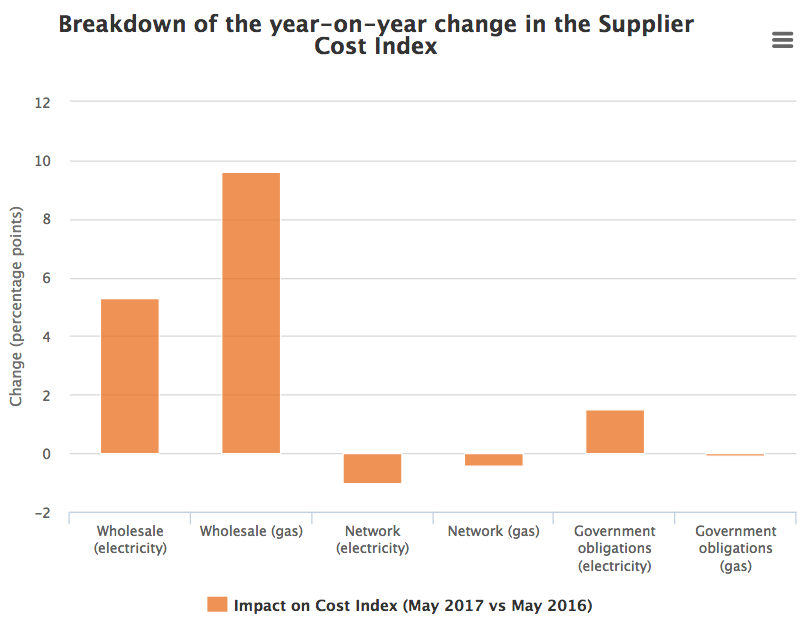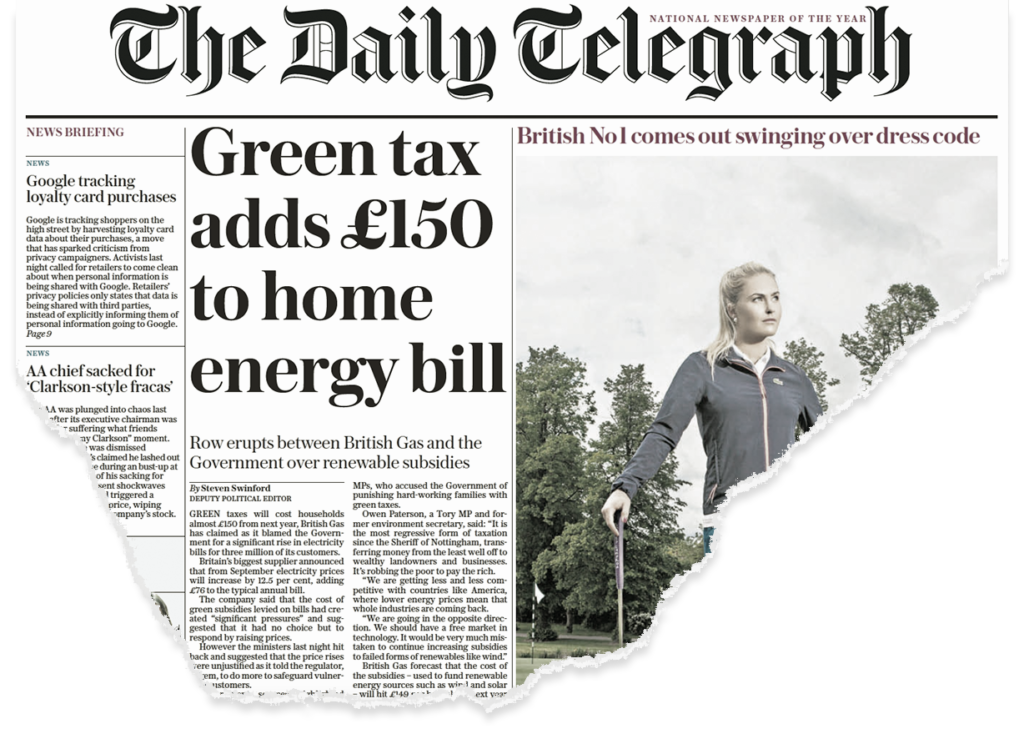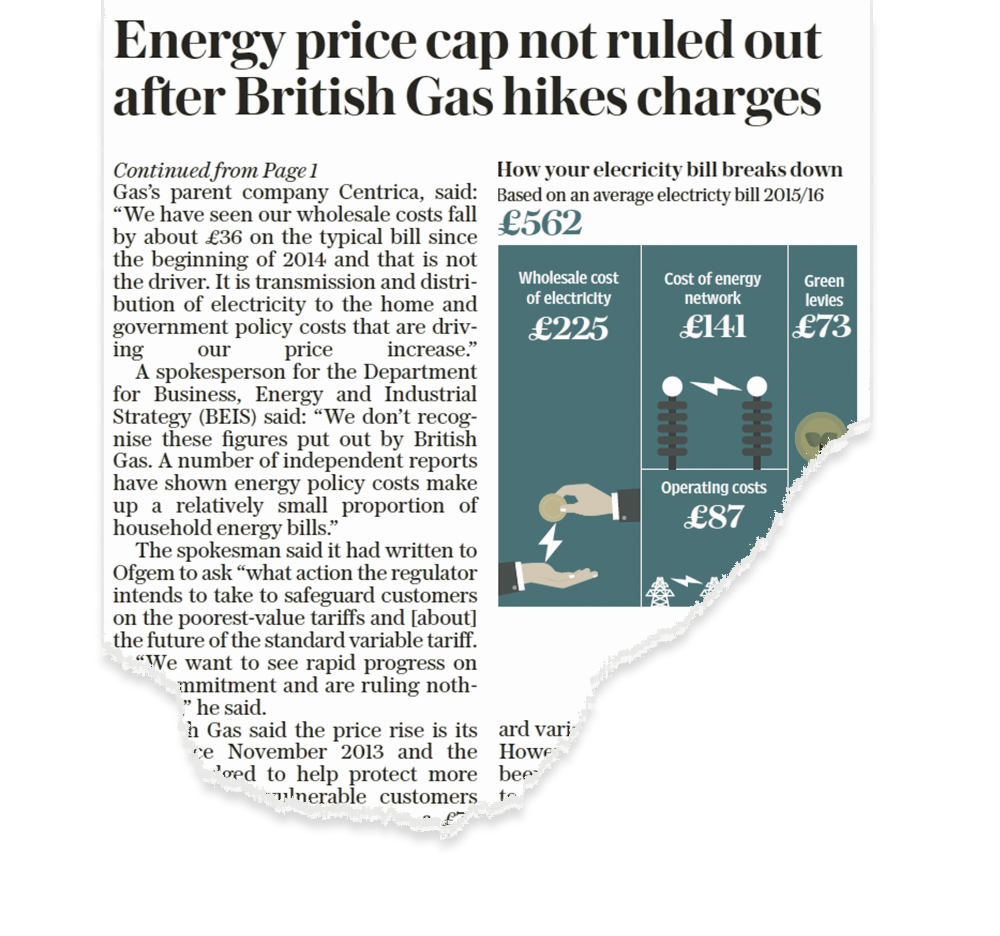
Factcheck: British Gas and Daily Telegraph make confusing claims over ‘green taxes’
Simon Evans
08.02.17Simon Evans
02.08.2017 | 5:16pmSeveral newspapers, most prominently the Daily Telegraph, are pointing the finger at “green taxes” today, after British Gas blamed policy costs for its latest energy bill price rise.
The UK’s largest utility is raising its electricity prices by 12.5% and scrapping its dual-fuel discount, adding £76 to customers’ average bills.
The claims revive the long-running debate over energy bills and the impact of government policy.
This debate typically ignores the significant savings that have resulted from energy efficiency policies to lower demand, focusing only on the smaller costs of supporting the development of low-carbon electricity.
Carbon Brief explains what makes up an average energy bill and how policy is influencing the total.
Latest claims
British Gas is the last of the “Big Six” major utilities to raise its electricity prices this year, the other firms having already done so this spring. Before these increases, energy bills had largely slipped off the political agenda, as average bills were in decline and public concern over paying them fell to record lows. (Update 3/8: Latest figures show public concern over energy bills is again at record lows).
Now, after each of the Big Six has raised prices, energy bills are firmly back on the political radar. Both the Conservatives and Labour promised to cap bills in their election manifestos, though Theresa May’s weakened post-election government appears to have backtracked on this.
In the wake of the British Gas announcement, a Daily Mail editorial today says: “British Gas claims [green levies] have added up to £98 to the average bill since 2014.”
(Update 3/8: Centrica has emailed Carbon Brief a table, showing £14 of this £98 relates to network costs. The remaining £84 covers “government mandates and policy”, a broad category that goes beyond what the Daily Mail calls “green levies”.)
Centrica has sent this table to back up its reasons for raising electricity prices pic.twitter.com/hAtKtkMePB
— Simon Evans (@DrSimEvans) August 3, 2017
Meanwhile, the Telegraph’s frontpage splash says: “Green taxes adds £150 to home energy bill”, above an article that goes on to say: “Green taxes will cost households almost £150 from next year, British Gas has claimed.”
In a video interview published with the online version of the Telegraph article, Centrica chief executive Iain Conn refers to the different figure on increases since 2014, saying:
“What is driving [the price rise] is the increase in transport and distribution costs, the costs of operating the grid and, secondly, the other area is environmental and policy costs, feed-in tariffs, the cost of building the data centre for the smart meter programme, the carbon pricing strategies. These are the things that increased by about, approaching £100, and so that is the driver for the increase in September of 12.5% on our electricity prices.”
These different numbers have caused confusion, not least within the Telegraph’s own article, which includes a chart showing “green levies” adding £73 to the average electricity bill in 2015/16.
Carbon Brief asked Centrica, British Gas’s parent company, to explain where these various figures come from. It had not responded by the time of publication.
(Update 3/8: Centrica has responded to Carbon Brief but has not explained why it publicly cited various different figures, nor has it broken down its totals for policy costs).
However, on a page announcing its interim 2017 financial results, Centrica has a graphic showing “environmental and social policies” adding £135 to average dual fuel bills in 2016.
This appears to be the key distinction missed in the Telegraph and Mail reporting, with British Gas referring to the cost of all policies, including carbon reduction and fuel poverty, whereas the newspapers conflate this total with “green taxes”.
A spokesperson for the Department for Business, Energy and Industrial Strategy (BEIS) says in an emailed press statement:
“We don’t recognise these figures put out by British Gas. A number of independent reports have shown energy policy costs make up a relatively small proportion of household energy bills.”
In a subsequent emailed statement, BEIS adds:
“Policies driving energy efficiency improvements have more than offset the cost of energy policies and have resulted in lower energy bills on average for UK households, as independent reports have found, so it would be wrong to suggest they are increasing people’s bills.”
See below for more on the balance between policy costs and savings.
Average bills
In March, the Committee on Climate Change (CCC), the government’s advisors, published one of these independent reports, which Carbon Brief covered at the time. It gives a much clearer picture of the makeup of average energy bills than the one provided by British Gas.
According to the CCC, climate policy costs – which could be equated with “green levies”, or pejoratively labelled as “green taxes” – added around £100 to an average, dual-fuel energy bill for gas and electricity in 2016. This is less than 9% of the total, as the chart below shows. (It is worth noting that British Gas is only increasing its electricity bills. The vast majority of policy costs are added to electricity prices alone.)
Makeup of the average UK dual-fuel domestic energy bill in 2016. Climate policy costs are shown in red, while other policy costs are shown in light blue. Hover over the chart to see costs in pounds, and shares of the total bill. Source: CCC Energy Prices and Bill. Chart by Carbon Brief using Highcharts. Image credit: Andrew Fox Alamy Stock PhotoThis £104 figure for climate policy costs in 2016 is up just £10, from £94 in 2014. In contrast, British Gas claims that policy costs, along with network costs, have increased by £98 since 2014. This discrepancy is hard to reconcile. As mentioned above, Carbon Brief has requested an explanation from Centrica.
(Update 3/8: Centrica says £14 of this £98 increase is due to network costs. The £84 increase that it says is due to policy costs remains hard to reconcile with independent data from the CCC, for a variety of reasons. According to the CCC, climate and other policy costs increased by £46 over the time period between 2008 and 2016, as the table below shows. The timing in Centrica’s “forward view”, to which the £98 increase relates, is unclear. It appears to refer to bill impacts in the 12 months after its price rise takes effect, from September 2017. From 2008 through 2020, the CCC says policy costs on electricity bills will increase by £74 , which is still well below the increase cited by Centrica despite covering a longer period.)
The CCC breaks down all policy costs on electricity bills, in detail, in this table:https://t.co/XBdMzYHEgI pic.twitter.com/81LYVh7zri
— Simon Evans (@DrSimEvans) August 3, 2017
Looking ahead, the CCC expects climate policy costs to increase to £110 during 2017. As explained in more detail in March, the CCC’s figures are inclusive of all direct and indirect costs associated with climate policy.
This includes energy efficiency, carbon pricing, low-carbon subsidies, the costs of integrating renewable energy into the grid and compensating conventional generation for lost revenue through the capacity market. It also includes savings from the merit-order effect, whereby renewables push down wholesale prices by forcing the most expensive power stations out of the mix.
However, these figures do not include costs related to social policy, namely the Warm Home Discount, which helps cut the bills of those receiving benefits, and the part of the Energy Companies Obligation (ECO) scheme devoted to taking homes out of fuel poverty.
Climate policy costs, as listed by the CCC, also exclude the roll out of smart meters, which adds around £15 to the average bill in 2016. Smart meters are a vital part of modernising the UK’s ageing grid infrastructure, an effort that could unlock savings of up to £40bn by 2050.
Old grid infrastructure will have to be replaced, whether or not the UK pursues its legally-binding carbon reduction targets.
In total, smart meters, social policy, climate policy and associated costs add an estimated £140 to the average dual fuel bill in 2016, the CCC says. This figure is close to the £135 cost of “environmental and social policies” cited by Centrica on its website.
Allowing for modest increases expected in 2017, this could explain the £149 figure rounded up to £150 in the Telegraph headline. It’s worth repeating that contrary to the headline, however, this amount includes smart meters and social policy, in addition to what the paper calls “green taxes”. (Update 3/8: Centrica would not explain the origin of the £149 figure cited by the Telegraph, which is different to the £165 in the table it sent Carbon Brief. Nor would it give a breakdown of these totals, to show the split between climate and other policy costs.)
Rising costs
The Telegraph also fails to mention its own story from last year, which said energy firms’ profits were five times too high, according to the government’s Competition and Markets Authority. The watchdog, after investigating energy bills, said that profit margins should be cut to 1.25%.
Instead, British Gas has consistently had the highest margins in the sector. Its average pre-tax profit margin over the past eight years of 7.0% is twice the 3.4% aggregate average of all Big Six energy firms during the same period.
The Telegraph and British Gas also ignore recent findings from energy regulator Ofgem, which show that wholesale energy price rises over the past 12 months have raised costs for utility firms. Contrary to British Gas’s justifications, Ofgem’s figures show that while policy costs have increased over the past year, network costs have fallen.

Percentage point changes in the underlying cost drivers for utilities over the past year. Source: Ofgem supplier cost index.
Each of the utilities gave slightly different reasons when raising its prices this year (see press coverage of the E.On, EDF, npower, Scottish Power and SSE announcements). Furthermore, hedging strategies might delay the impact of changes in wholesale prices. Yet these underlying cost drivers, identified by Ofgem, are likely to have been part of the reason for recent price hikes.
Though this was not mentioned by British Gas, a BEIS report published last week says rising wholesale energy prices are partly due to the weak pound, which has fallen in the wake of the EU referendum in mid-2016.
“Btwn Q1 2016 & Q1 2017… price of gas [in cash terms, for power stations] rose by 24%” <– cites weaker pound as underlying cause https://t.co/ntqYFdiH3l
— Simon Evans (@DrSimEvans) August 1, 2017
(Update 4/8: A UK wholesale electricity price index from data provider ICIS agrees with Ofgem’s view that costs increased between May 2016 and May 2017. ICIS points to French nuclear outages as a factor in higher prices over winter 2016-17. However, the ICIS index also shows that wholesale prices remain below the levels seen in 2013 and 2014. Note that an earlier update to this article suggested the Ofgem and ICIS figures on wholesale prices were contradictory. This was incorrect.)
It’s possible that British Gas is justifying its price hike by comparison with costs over a longer time period, given that it cites 2014 in some of its media statements. However, according to information provided by BEIS, “Ofgem figures show the main costs of supplying a typical domestic customer are 4% lower than at January 2015.”)
Efficiency saving
More substantively, the Telegraph, Mail and others fail to give a full picture of the impact of government policy on bills. In its emailed statement, BEIS notes the CCC’s finding that energy efficiency policies have helped cut bills, more than outweighing increases added by policy costs.
Between 2004 and 2016, the CCC says improved energy efficiency helped cut average bills by £490, with £290 of that saving coming since 2008. These numbers are rarely mentioned during the energy bills debate.
Crucially, the CCC says there are still cost-effective energy efficiency savings available, worth an average of £150-£210 by 2030. These extra savings – which will only be unlocked with more ambitious energy efficiency policies – could more than offset an expected £95 increase in policy costs over the same period.
Update 3/8/17 – Article updated after receiving a response from Centrica. Additional information from other sources was also added.
-
Factcheck: British Gas and Daily Telegraph make confusing claims over 'green taxes'



